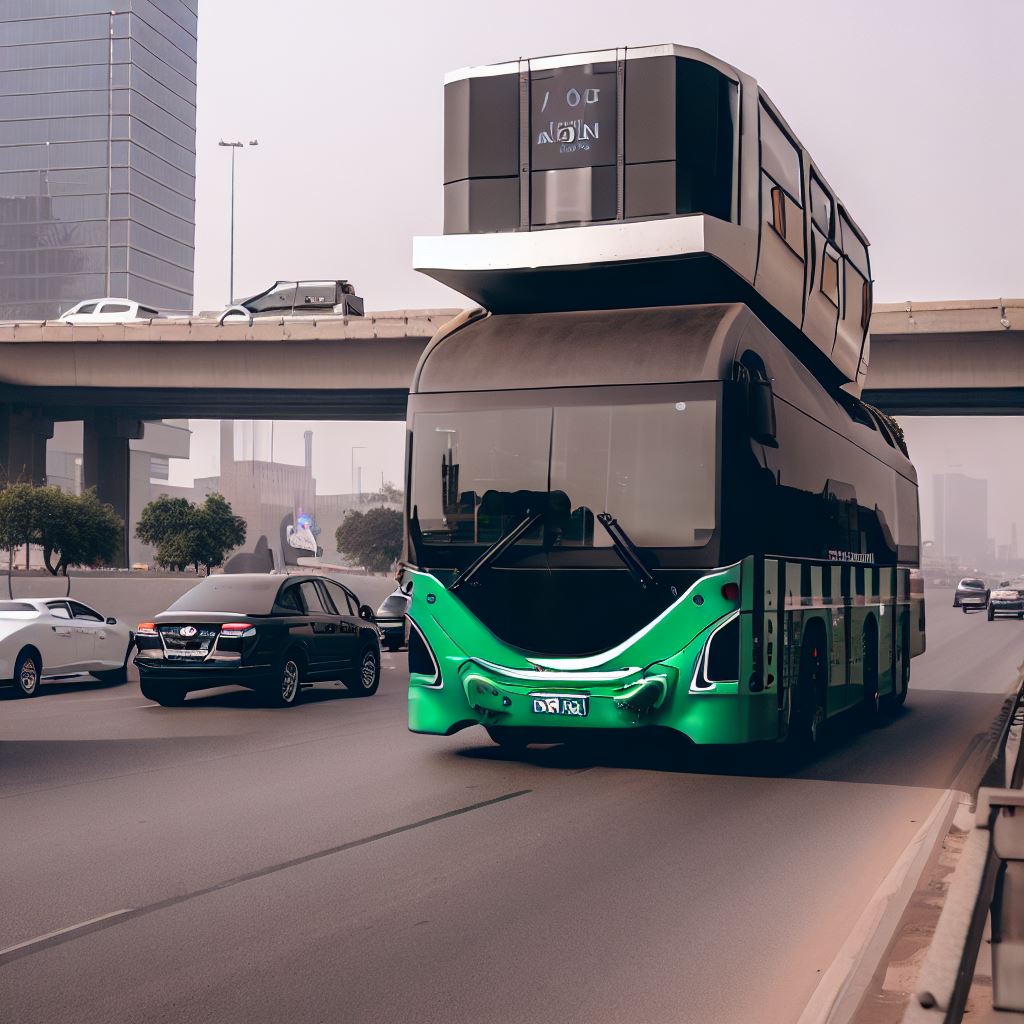Introduction
In the dynamic landscape of Nigeria’s transportation sector, government initiatives and private investments are driving advancements in bus technology in Nigeria.
The advancements in Nigeria’s bus technology have ushered in a remarkable transformation, redefining the way people move within the country.
This transit leap is not just noteworthy; it’s a game-changer that resonates with the broader context of transportation development, emphasizing efficiency and accessibility.
The “advancements-in-nigeria-bus-technology” have become the cornerstone of this transformative journey.
These technological marvels, ranging from eco-friendly buses to smart ticketing systems and GPS-enabled tracking, have reinvigorated the transportation infrastructure.
Gone are the days of overcrowded, unreliable buses; today, passengers enjoy comfort, safety, and punctuality.
These advancements aren’t merely about upgrading buses; they symbolize a commitment to progress.
They bridge gaps in accessibility, reduce environmental impact, and enhance overall travel experiences.
Nigeria’s bus technology advancements are more than a section; they are the opening lines of a novel that promises a brighter, more connected future for all.
Evolution of Bus Technology in Nigeria
Historical Background of Bus Technology in Nigeria
Nigeria’s bus technology has come a long way since its inception in the early 1900s. Initially, the country heavily relied on horse-drawn carriages for public transportation.
However, the introduction of motor vehicles in the 1920s paved the way for the modernization of Nigeria’s bus transportation system.
During this period, buses were imported from Europe and the United States, creating a much-needed shift from traditional modes of transport.
These early buses, although basic in design, provided a more efficient way of commuting, allowing for the transportation of larger groups of people.
While the bus industry was initially operated by private individuals, the Nigerian government recognized the importance of public transportation and gradually took steps to regulate and improve the sector.
Current Challenges in Nigerian Public Transportation
Major challenges faced by Nigeria’s public transportation system
- Inadequate Infrastructure: Nigeria’s public transportation system suffers from a lack of well-maintained roads, bridges, and transport terminals.
- Limited Availability of Vehicles: The number of vehicles in Nigeria is insufficient to cater to the growing population’s transportation needs.
- Poor Maintenance of Vehicles: Many public transportation vehicles in Nigeria are old and poorly maintained, leading to frequent breakdowns and accidents.
- Traffic Congestion: Nigerian cities are notorious for heavy traffic congestion, causing delays and making commutes longer and more frustrating.
- Inefficient Public Transportation Network: The public transportation network in Nigeria lacks coordination and integration, leading to ineffective services.
The impact of these challenges on commuters and the economy
- Increased Travel Time: The inadequate infrastructure and traffic congestion result in longer travel times for commuters, wasting valuable time and productivity.
- Poor Service Quality: The limited availability and poor maintenance of vehicles contribute to uncomfortable and unreliable transportation experiences for passengers.
- Safety Concerns: The poorly maintained vehicles and road infrastructure pose safety risks to commuters, leading to accidents and injuries.
- Economic Productivity Loss: Inefficient public transportation leads to decreased workforce productivity as employees spend more time commuting instead of working.
- Environmental Impact: The heavy traffic congestion and inefficient public transportation system contribute to increased air pollution and carbon emissions.
- Increased Cost of Living: Limited transportation options and longer travel times can lead to increased transportation expenses for commuters, affecting their overall cost of living.
- Inequality: The challenges faced by the public transportation system in Nigeria disproportionately affect low-income individuals who heavily rely on public transportation.
- Urbanization Challenges: As Nigeria’s cities continue to grow rapidly, the inadequate public transportation system struggles to keep up with the increasing demand.
In the face of ongoing challenges, Nigeria’s government and transportation authorities are committed to enhancing the public transportation system.
They’re actively implementing Bus Rapid Transit (BRT) systems and expanding rail networks to provide efficient travel options.
Technological advancements, like mobile apps for booking and tracking services, are streamlining commutes, while smart card payments boost efficiency.
Nevertheless, conquering these obstacles demands long-term planning, investment, and collaboration across sectors.
Prioritizing infrastructure development, fleet expansion, and network integration is essential.
By surmounting these hurdles with advancements in Nigeria’s bus technology, the nation can elevate mobility, improve commuting experiences, and drive economic growth.
A reliable public transportation system is vital for sustainable development, reduced traffic congestion, and a more inclusive society.
Read: Wind-Turbine Maintenance: An In-Depth Look in Nigeria
Innovations in Bus Technology
The recent advancements in bus technology globally
In today’s fast-paced world, advancements in technology have transcended various industries, including the transportation sector.
As urban areas continue to expand and traffic congestion becomes a daily struggle, the need for efficient and sustainable public transportation systems has become paramount.
Bus technology has come a long way over the years, incorporating modern innovations that aim to enhance passenger comfort, increase efficiency, and reduce environmental impact.
Globally, there are several noteworthy advancements that have shaped the future of bus transportation.
One significant innovation in the bus industry is the development of electric buses.
These vehicles run solely on electricity, eliminating harmful emissions and reducing dependence on fossil fuels.
From improved battery technology to rapid charging infrastructure, electric buses have made significant progress in recent years, gaining traction in various countries around the world.
Another prominent advancement in bus technology is the integration of smart features.
These include real-time monitoring systems, automated fare collection, and advanced safety features.
By harnessing the power of data and connectivity, bus operators can optimize routes, reduce downtime, and provide a more convenient and reliable service to passengers.
Furthermore, autonomous buses are revolutionizing the field of public transportation.
These self-driving vehicles leverage cutting-edge technologies such as artificial intelligence and machine learning to navigate roads and transport passengers safely.
While still in the early stages of development, autonomous buses hold immense potential in transforming the way we perceive public transportation.
How these innovations are revolutionizing public transportation in Nigeria
Nigeria, like many other developing countries, faces numerous challenges when it comes to public transportation.
Congestion, inadequate infrastructure, and unreliable services are common issues that significantly impact the daily lives of Nigerians.
However, the recent advancements in bus technology offer a glimmer of hope for the country’s transit system.
The adoption of electric buses in Nigeria could address the twin problems of air pollution and dependence on fossil fuels.
With vast reserves of renewable energy sources such as solar and wind, the country has the potential to deploy electric buses on a significant scale.
This transition would not only reduce emissions but also contribute to Nigeria’s commitment to combating climate change.
Moreover, the integration of smart features in buses would revolutionize the passenger experience.
The use of real-time monitoring systems would enable operators to track vehicles, manage delays, and ensure adherence to schedules.
Additionally, advanced safety features like collision detection and emergency braking systems would enhance passenger safety, addressing a major concern in Nigeria’s transportation system.
While the concept of autonomous buses may seem distant, Nigeria could benefit greatly from embracing this technology in the long run.
Autonomous buses have the potential to address the shortage of skilled drivers, minimize human errors, and optimize route planning, leading to improved efficiency and reduced operating costs.
In review, bus technology is undergoing rapid advancements globally, transforming the way we perceive and utilize public transportation.
From electric buses to smart features and the potential of autonomous vehicles, these innovations hold great promise for addressing the challenges faced by Nigeria’s transit system.
By embracing these advancements, Nigeria can leapfrog into a more efficient and sustainable future of public transportation.
Initiatives and Investments
Government Initiatives
- The Nigerian government has taken significant steps to enhance bus technology in the country.
- One of the initiatives is the Bus Rapid Transit (BRT) system implemented in major cities like Lagos.
- The BRT system has improved transportation efficiency, reduced traffic congestion, and increased passenger comfort.
- The Federal Government allocated funds to support the development and expansion of BRT infrastructure.
- This investment aims to enhance the reliability, safety, and sustainability of public transportation in Nigeria.
- Additionally, the government has introduced policies to encourage the adoption of cleaner and more efficient bus technologies.
- The introduction of low-emission buses and the phasing out of older, less eco-friendly vehicles is an ongoing effort.
- These initiatives align with global goals on reducing carbon emissions and combating climate change.
Private Investments and Collaborations
- Private sector investments have played a crucial role in advancing bus technology in Nigeria.
- Companies like Innoson Vehicle Manufacturing have emerged as key players in the domestic bus manufacturing industry.
- Innoson has partnered with international companies, including China’s Yutong, to create locally-assembled buses.
- This collaboration has accelerated the transfer of technology and knowledge in bus manufacturing.
- Private companies have also invested in research and development to introduce innovative bus technologies.
- One example is the use of intelligent transportation systems, such as GPS tracking and automated fare collection systems.
- These technologies have improved operational efficiency, fleet management, and passenger experiences.
- Collaborations between private bus operators and technology companies have resulted in pilot projects for electric buses.
- The introduction of electric buses addresses environmental concerns and reduces dependence on fossil fuels.
- Investments in charging infrastructure have also been made to support the widespread adoption of electric buses.
- In addition to manufacturing and technology advancements, private investments have supported capacity building.
- Training programs for bus drivers, technicians, and maintenance staff ensure the proper operation and maintenance of modern buses.
- These collaborations between public and private sectors help foster innovation and bring new solutions to Nigeria’s transit sector.
Overall, government initiatives and private investments are driving advancements in bus technology in Nigeria.
The dedication to improving public transportation, reducing emissions, and enhancing passenger experiences is commendable.
With continued efforts and support, Nigeria’s transit sector is expected to witness further transformation and prosperity.
Read: Safety Protocols for Wind-Turbine Technicians in Nigeria

Benefits and Impact
The benefits of improved bus technology on Nigerian commuters
Improved bus technology in Nigeria has brought numerous benefits to commuters, contributing to a more efficient and comfortable transportation system.
- Enhanced Safety: Modern buses are equipped with advanced safety features, reducing the risk of accidents.
- Reduced Travel Time: With improved technology, buses can navigate traffic more effectively, resulting in shorter travel durations.
- Increased Comfort: Buses now offer amenities such as air conditioning, comfortable seating, and entertainment systems, enhancing the commuter experience.
- Better Accessibility: Advanced buses have features to accommodate individuals with disabilities, promoting inclusivity.
- Reliable Schedules: Bus technology allows for real-time tracking and updates, enabling commuters to plan their journeys more accurately.
Overall, these benefits make commuting by bus a more attractive option for Nigerians, easing daily transportation struggles.
The positive impact of efficient transportation on economic growth and sustainability
The adoption of efficient bus technology in Nigeria has had a significant positive impact on both economic growth and sustainability.
- Economic Growth: Improved transportation systems attract businesses, leading to increased investment and job opportunities.
- Enhanced Productivity: Efficient transportation reduces travel time for workers, allowing them to spend more time on productive activities.
- Cost Savings: Advanced bus technology optimizes fuel consumption, resulting in lower transportation costs for both individuals and businesses.
- Reduced Congestion: Efficient public transportation alleviates traffic congestion, improving overall urban mobility and reducing pollution.
- Environmental Sustainability: Lower emissions from buses with better technology contribute to a cleaner and greener environment.
- Social Equity: Affordable and efficient transportation benefits underserved communities, enabling better access to education, healthcare, and job opportunities.
These positive impacts demonstrate the crucial role that improved bus technology plays in Nigeria’s development and progress.
In short, the benefits of improved bus technology on Nigerian commuters are evident in terms of enhanced safety, reduced travel time, increased comfort, better accessibility, and reliable schedules.
These advantages make commuting by bus a preferable option, addressing the challenges faced by Nigerians in their daily transportation needs.
Furthermore, the positive impact of efficient transportation extends to economic growth, productivity, cost savings, reduced congestion, environmental sustainability, and social equity.
The advancements in bus technology contribute to attracting investments, improving urban mobility, and creating a cleaner and more inclusive society.
As Nigeria continues to invest in improving its bus technology and transportation infrastructure, both commuters and the nation as a whole will enjoy the benefits of a more efficient, safe, and sustainable transit system.
Read: The Impact of Renewable Energy on Jobs: Nigeria’s Wind Sector
Challenges and Future Prospects
Challenges associated with implementing advanced bus technology in Nigeria
- Limited Infrastructure: Nigeria’s inadequate road network poses a challenge in integrating advanced bus technology.
- High Cost: Implementing advanced bus technology requires significant investment, which may be a financial challenge.
- Lack of Awareness: Many Nigerians are not familiar with the benefits and capabilities of advanced bus technology.
- Maintenance and Training: Ongoing maintenance and training for personnel can be challenging to sustain.
- Political Will: Lack of government support and policies to promote advanced bus technology hinders its implementation.
Potential solutions and future prospects for continued advancements
- Infrastructure Development: The government must invest in improving road infrastructure to facilitate advanced bus technology integration.
- Public-Private Partnerships: Collaboration between government and private entities can help overcome financial barriers.
- Public Awareness Campaigns: Educating the public about the advantages of advanced bus technology is crucial for its acceptance.
- Skill Development Programs: Training programs should be initiated to equip personnel with the necessary skills for maintenance and operation.
- Policy Reforms: The government should formulate supportive policies and regulations to encourage the use of advanced bus technology.
Looking towards the future, Nigeria has significant prospects for continued advancements in bus technology.
- Electric Buses: Transitioning to electric buses can reduce pollution and reliance on fossil fuels, promoting a greener transportation system.
- Intelligent Transportation Systems: Implementing intelligent systems can enhance efficiency, safety, and traffic management.
- Smart Ticketing and Payment Systems: Introducing convenient and secure ticketing and payment methods can improve the commuter experience.
- Integration with Mobility Services: Integrating advanced bus technology with ride-sharing and other mobility services can enhance overall transportation options.
- Data-Driven Decision Making: Utilizing data analytics can optimize bus routes, schedules, and passenger demand, resulting in improved service.
In fact, while there are challenges associated with implementing advanced bus technology in Nigeria, there are also potential solutions and future prospects.
With proper infrastructure development, public-private partnerships, awareness campaigns, skill development programs, and favorable policies, Nigeria can overcome these challenges and pave the way for continued advancements in its transit system.
By embracing electric buses, intelligent transportation systems, smart ticketing, and data-driven decision making, Nigeria can transform its transit leap into a sustainable, efficient, and commuter-friendly transportation system.
Case Studies: Successful Implementation
Case studies of cities or regions in Nigeria successfully embracing advanced bus technology
- Lagos: The Bus Rapid Transit (BRT) system in Lagos has revolutionized public transportation, reducing congestion and improving efficiency.
- Abuja: The Abuja Metro Mass Transit System has provided reliable and comfortable transportation options for residents and reduced traffic congestion.
- Ibadan: The Ibadan Intra-City Transit (IBR) system has enhanced connectivity within the city and improved commuting for residents.
Positive outcomes and impact of these implementations
- Reduced congestion: Advanced bus technology has significantly reduced traffic congestion in these cities, resulting in smoother traffic flow.
- Improved efficiency: The implementation of advanced bus technology has made public transportation more efficient, with reduced travel times for commuters.
- Enhanced accessibility: These implementations have made transportation more accessible to a larger population, including individuals with disabilities.
- Environmental benefits: The adoption of advanced bus technology has helped to reduce carbon emissions and improve air quality in these cities.
- Reduced transport costs: Residents have been able to save money on transportation costs due to the affordability and reliability of advanced bus systems.
- Boosted economic growth: The efficient transportation systems have facilitated the movement of goods and people, contributing to economic development in these regions.
- Improved quality of life: The availability of reliable and comfortable public transportation has enhanced the overall quality of life for residents in these cities.
- Job creation: The implementation of advanced bus technology has created job opportunities in various sectors, including bus manufacturing, maintenance, and operations.
- Increased safety: These advanced bus systems have implemented safety features, reducing the number of accidents and improving passenger security.
- Technological advancement: Embracing advanced bus technology has demonstrated Nigeria’s commitment to innovation and keeping up with global transportation trends.
The successful case studies mentioned above highlight the potential and positive impact of advanced bus technology in Nigeria.
These implementations have not only improved transportation but also contributed to economic growth, reduced environmental harm, and enhanced the overall well-being of residents.
By continuing to embrace and invest in advanced bus technology, Nigeria can further advance its transit system and support sustainable development in the country.
Read: The Impact of COVID-19 on Janitors in Nigeria
Conclusion
A recap of the advancements in bus technology in Nigeria discussed throughout the blog post:
- Nigeria’s transit system has seen significant advancements in recent years.
- The introduction of smart bus systems has improved efficiency and passenger experience.
- Newly implemented GPS tracking and electronic ticketing systems have enhanced security and convenience.
- The adoption of clean energy buses has led to reduced environmental impact.
- Nigeria is becoming a leader in bus technology innovation in Africa.
Emphasizing the significance of Nigeria’s transit leap and the potential for further growth and development in the sector:
Nigeria’s transit leap is a game-changer for the country, revolutionizing its transportation infrastructure and benefiting both the economy and the environment.
The advancements in bus technology have not only improved the efficiency and reliability of public transportation but have also provided a more comfortable and convenient experience for commuters.
The adoption of smart bus systems, GPS tracking, and electronic ticketing has significantly enhanced the safety and security of passengers while reducing incidents of fraud.
Furthermore, Nigeria’s advancements in bus technology have put the country at the forefront of innovation in Africa, attracting international attention and potential investment opportunities.
With the continued support and investment in the sector, there is enormous potential for further growth and development, leading to improved public transportation infrastructure, increased job opportunities, and enhanced economic development.
In summary, Nigeria’s transit leap through advancements in bus technology marks a remarkable milestone in the country’s journey towards a more efficient, sustainable, and technologically advanced transportation system.
The potential for further growth and development in the sector is vast, and it is essential for stakeholders to continue promoting and investing in these advancements to maximize their benefits for Nigeria and its people.




